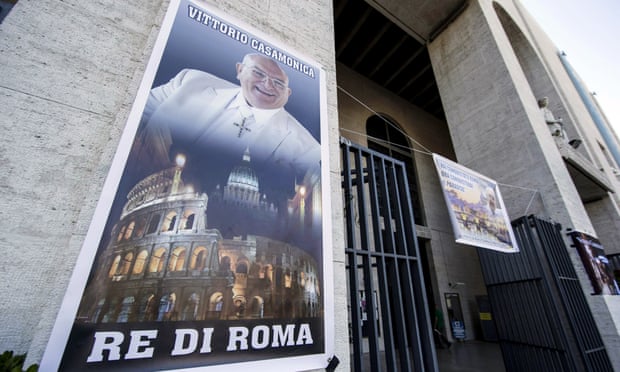Romans aghast at revelations of official corruption tied to the mafia found new reason for outrage after the Hollywood-style funeral of a purported local crime boss – replete with a gilded horse-drawn carriage, flower petals tossed from a helicopter and the theme music from The Godfather playing outside the church. Hundreds of tearful mourners paid their final respects to Vittorio Casamonica, 65, at the San Giovanni Bosco church on Rome’s outskirts. The Casamonica clan has been accused of racketeering, extortion and usury. Rome city hall said on Thursday that Vittorio Casamonica himself was the subject of “many investigations into Roman criminality”. “Never again. Rome cannot be defaced by those who want it to became the set of the Godfather,” said Matteo Orfini, president of the ruling Democratic party. “You conquered Rome, now you’ll conquer paradise,” read a banner affixed to the entrance of the church. “King of Rome” read another, featuring Casamonica’s image, the Colosseum and St Peter’s Basilica. Mayor Ignazio Marino called Rome’s prefect demanding to know how such a scene could have taken place and said it was “intolerable that funerals are used by the living to send mafia messages”. The parish priest, the Reverend Giancarlo Manieri, said he had no control over what happened outside the church and that inside the funeral was celebrated normally, the Ansa news agency reported. Lawmakers expressed outrage at the scene, which played out on TV newscasts all afternoon and evening: six black horses pulling an antique black-and-gold carriage to a stop in front of the church as a band played music from The Godfather and mourners tossed bouquets of flowers as the casket was carried into the church. At one point a low-flying helicopter dropped red rose petals on the crowd below. More were thrown from the back of a lorry. The funeral came a day after a judge set 5 November as the start date for the trial of 59 people charged in a spiralling mafia investigation in the capital, in which local criminal bosses allegedly managed to cement ties with city politicians over lucrative public contracts. Rosy Bindi, president of the parliamentary anti-mafia commission, said it was “alarming” that a funeral for someone purportedly caught up in the mob could be “transformed into an ostentatious show of mafia power”. She said it was proof that the mafia had firmly infiltrated Rome and called for a redoubling of efforts to rout it from public administration. The hard-left SEL party called on interior minister Angelino Alfano to explain how such a funeral could take place. “These funerals might seem like a folkloric custom, but in reality they send a clear message of impunity on the part of the clans: we still exist and we are powerful,” SEL politicians Arturo Scotto and Celeste Costantino wrote in a statement. “That is unacceptable in a democratic state.” Police said the mourned patriach had led the Casamonica clan active in the south-west part of the capital but they played down his importance, saying he had been “on the margins” of organised crime overall and had not emerged as a suspect in recent mafia investigations.

Rome’s corruption has long thrived on the connivance of city politicians, administrators and local gangsters, who have no formal ties to the traditional southern crime syndicates. A prosecutor famed for fighting Sicily’s Cosa Nostra has been enlisted to help root out city hall corruption. The mafia fighter was enlisted following dozens of arrests since late 2014 of city politicians and businessmen with links to the political right and left. On Thursday several commentators noted the irony that a reported mob boss was allowed an elaborate funeral at the church while the Archdiocese of Rome refused to allow a funeral at the same church in 2006 for Piergiorgio Welby, then the symbol of Italy’s right-to-die movement. Welby, who had muscular dystrophy and was unable to eat, speak or breathe on his own, got his wish to die in December 2006 when a doctor disconnected his respirator. His case split the overwhelmingly Catholic nation but the local church defended its decision to deny him a Catholic funeral, arguing that allowing it would have legitimised attitudes contrary to God’s law.







Comments are closed.